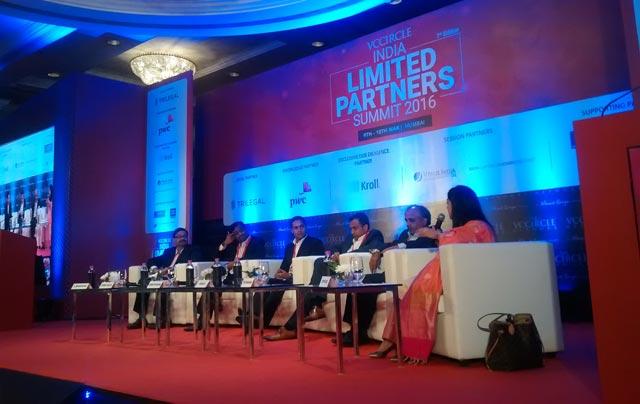A long exit window, splits among PE partners and lack of enough secondary data to conduct due diligence are the biggest challenges limited partners (LPs) face while investing in Indian private equity and venture capital funds, according to participants at VCCircle India Limited Partners Summit.
The seventh edition of VCCircle’s flagship summit, held in Mumbai on March 9 and 10, hosted top executives of private equity and venture capital firms as well as investors, besides deal makers, consultants and executives from corporate houses.
Participating in a panel discussion on fundraising outlook for 2016, Alagappan Murugappan, managing director and head of Asia funds at CDC Group, said that exits are taking a long time in India. “We committed $1.4 billion in India in 10-12 years. Only $400 million has returned to us,” he said.
CDC group is the UK government-owned fund of fund with net assets of around $4 billion.
According to TCM Sundaram, co-founder and managing director at venture capital firm IDG Ventures India, many PE-backed companies are traditionally focused on floating initial public offerings where exits take a longer time. “Indian GPs (general partners) are like Abhimanyu in the Chakravyuh, struggling to exit from their investments,” he said, referring to the young warrior in the epic Mahabharata who couldn’t get out of a labyrinth created by the enemy.
Sundaram, however, said first-generation tech entrepreneurs, some of whom worked in Silicon Valley, are more open to strategic acquisitions. “This makes it easier for VC investors to get exits,” he added.
“Indian GPs are like Abhimanyu in the Chakravyuh, struggling to exit from their investments,” said TCM Sundaram, co-founder, IDG Ventures India
Sudhir Variyar, managing director at Multiples Alternate Asset Management, offered another reason why LPs are becoming cautious. “Indian GPs are not good at holding together partnerships; too many splits and spin-offs are taking place,” he said.
Some panelists said due diligence is tougher in India due to the absence of enough secondary data and reluctance among promoters of the family-run businesses to share information with investors.
“In India, we don’t have sufficient secondary research data. However, the situation is far better than what it was 10 years ago,” said Sanjay Chaudhary, partner, Tata Capital Growth Fund.
But many panelists also felt that an increasing number of promoters are now open to sharing information with prospective investors.
“Companies today are willing to work together with investors. There is less pushback today in providing company-related information,” Ravindra Bandhakavi, partner at law firm Trilegal.
Rahul Khanna, managing partner at venture debt firm Trifecta Capital, said PE and VC firms should focus on getting on board high-quality anchor investors who would help with access and branding.
Sanjay Nath, co-founder and managing partner at Blume Venture Advisors, participation of domestic wealthy individuals is increasing in venture capital fundraising.
“VCs are now going the domestic route. This is unexpected but a welcome change,” Nath said. “You cannot afford to ignore domestic capital today,” he added.





